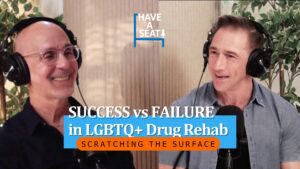Deciding to remove a substance from your life is a huge step. But after the initial excitement wears off, you might ask more practical questions, like “how long does it take to break an addiction?”
The truth is, there’s no universal answer. Recovery time varies, depending on things like your genes, your environment, and the type of addiction.
This article will explore what affects your recovery timeline, helping you set realistic goals for your journey to a healthier life.
Choosing the right treatment center can help you overcome your addiction faster. Discover what La Fuente has to offer by calling 888.903.9898.
What is Addiction?
Addiction is a complex and chronic medical condition characterized by ongoing substance use or behavior, even in the face of negative consequences. While addiction isn’t a formal diagnosis, it’s often diagnosed as a substance use disorder, ranging from mild to severe.
Developing an addiction results from a combination of genetic, biological, and environmental factors. However, the primary mechanism involves the brain’s reward center. When you take substances, the reward center releases feel-good chemicals, creating a sense of euphoria. This pleasurable experience motivates users to keep returning to the drug.
Over time, the brain adapts to this artificial stimulation and reduces its natural production of feel-good chemicals. As a result, users experience unpleasant withdrawal symptoms and intense cravings when they don’t use the substance. Eventually, many find themselves taking the drug just to feel normal or avoid these withdrawal effects.
Features of Addiction
While there are various types of addiction, they all share certain common features. These typically include:
- Intense urges to use the substance
- Inability to control the amount taken
- Continued use despite negative consequences
- Preoccupation with finding and using the substance
- Increased tolerance, requiring more of the substance to achieve the same effect
- Withdrawal symptoms when attempting to stop or reduce use
Addiction can cause serious problems in various aspects of life, including relationships, employment, and finances. It often leads to legal issues, particularly when illegal substances are involved. Furthermore, addiction can result in significant health complications, such as liver disease, heart problems, and lung damage.
These consequences impact your quality of life and overall well-being, underscoring the far-reaching effects of addiction beyond just physical dependence.
Factors Affecting the Recovery Timeline
The amount of time required to break an addiction relies on a variety of factors, including:
Genetics or family history of addiction
Having a family member with a substance addiction increases the risk of you developing an addiction. It can also increase your risk of relapse.
Personal history of other addictions
Also known as cross-addiction, addiction transfer, or addiction interaction, people with one addiction are more likely to have an addiction to something else.
The types of substances
Every drug has the potential for abuse, however, drugs like cocaine and heroin are more addictive than marijuana or ecstasy.
How long you’ve been addicted
In many cases, the longer you’ve been addicted to something, the longer it takes to kick the habit. This is because the brain has become so used to the substance (and the associated behaviors) that it takes longer to develop new habits.
Conditions like post-traumatic stress disorder (PTSD) or anxiety can make recovery more challenging and cause it to take longer.
Environment
Simple things like having a roof over your head, enough food to eat, and a reliable source of income can make the recovery process easier and shorter.
Social support
Surrounding yourself with sober people who support your recovery can speed up the recovery process.
Type of treatment
Whether you choose inpatient or outpatient treatment can significantly affect recovery time. Inpatient programs often lead to faster initial progress due to their intensity and controlled environment. Outpatient treatments, while more flexible, may require more time as individuals navigate daily life alongside recovery.
Breaking an Addiction: How Long Does it Really Take?
The timeline for overcoming addiction varies widely, with popular theories ranging from 21 days to 90 days or more. In reality, there’s no one-size-fits-all answer. The process depends on many factors, including the substance, addiction duration, age, and treatment approach.
With that said many experts advocate for a minimum 90-day treatment period. Longer programs yield better outcomes because they give the brain time to reset and allow users to strengthen their recovery skills.
It’s important to remember that a 90-day treatment program is just the beginning. Addiction is an ongoing medical condition that takes years of sustained effort to manage.
Choose La Fuente and Break the Addiction Cycle
While some factors in addiction recovery are beyond your control, choosing the right treatment center can significantly impact your success. For members of the LGBTQ community, there’s no better place than La Fuente Hollywood Treatment Center.
Located in Los Angeles, La Fuente is a leading LGBTQ-affirmative treatment center. We provide a compassionate, tailored approach to substance use treatment, ensuring you receive top-notch care that respects your identity and unique needs.
And our support extends well beyond the initial treatment period. With options like sober living homes and an active alumni program, La Fuente helps you build a strong foundation for lasting recovery.
Call La Fuente today at 888.903.9898.




